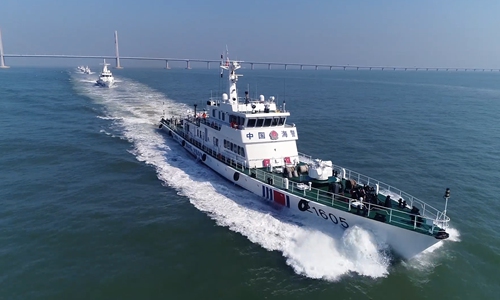China’s armed police to join maritime law enforcement: draft amendment
By Zhang Han Source:Global Times Published: 2020/4/27 19:23:23

Photo: screenshot from the Wechat account of China Coast Guard
A draft amendment to China's Law on the People's Armed Police Force (PAP) has added sections about organization and command, and extended the troops' scope of responsibilities to cover domestic affairs as well as maritime law enforcement, which experts said is a timely move to meet new demands and legalize the results of an earlier military reform.
The draft was submitted on Sunday during the 17th session of the Standing Committee of the 13th National People's Congress, China's top legislature, the Xinhua News Agency reported.
The main addition in the amendment is a new chapter on "Organization and Command," and the chapter "Missions and Duty" was divided into two chapters, "Mission" and "Function and Power."
The amendment details the scope of sentry duty, increases regulation of the responsibilities for emergency response, anti-terrorism and disaster relief, and stipulates the duty to carry out maritime law enforcement and defense combat by citing the related law.
Li Daguang, a professor at the National Defense University of the People's Liberation Army, noted it is a good time to revise the law and regulations that cover the PAP, as the most recent version enacted in 2009 can no longer meet the demands of national defense and military reforms.
In the reforms, command of the PAP is jointly held by the Central Committee of the Communist Party of China and the Central Military Commission. The status of the armed police force was no longer subordinate to the State Council, China's cabinet, as of 2018, when China reformed the dual command structure.
In March 2018, civilian functions like armed police gold force, forestry and public security forces (border control and firefighting) were severed from the PAP, and the China Coast Guard was consolidated with PAP.
Li told the Global Times on Monday that the revision will cement the fruits of reform and guide the future command of the PAP in a clear and orderly manner.
The transfer from the dual command structure to one of being completely under the Central Military Commission generated the adjustment in the PAP's role, Li said, noting the force not only tackles domestic affairs like rescue and disaster relief and anti-terrorism, but also extends its mission to maritime operations and defense combat like the regular army.
The draft also includes enhanced supervisory powers over the PAP.
Supervisory committees with the Central Military Commission and at all levels shall supervise the force during its missions, and the people's government, related authorities, Chinese citizens, legal personnel, and other organizations can also participate, according to Xinhua.
Strengthened supervision and centralized command will facilitate the smooth operation of the PAP, Li noted.
Posted in: SOCIETY,CHINA FOCUS